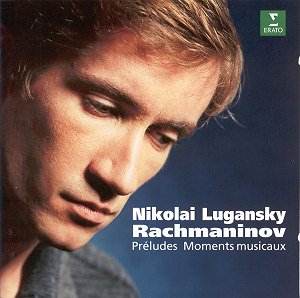Nikolai Lugansky undoubtedly has the technique for
Rachmaninov's taxing piano music. The composer conceived it all with
himself in mind, of course, and made his demands accordingly. On this
new disc those demands are met with huge technical accomplishment.
The recording sessions for Erato were undertaken at
the Teldec Studio in Berlin, using an impressive-sounding Steinway instrument
in just the right acoustic for this repertoire. Capturing an appropriate
sound for a piano recital is by no means easy, but the engineers have
been pretty successful on this occasion. Try one of the most impressive
tracks on the disc, the G minor Alla marcia Prelude from Opus 23, in
which the effect is frankly thrilling: no other word will do. This of
course is also because the playing deserves the same enthusiastic adjective,
with the rhythmic drive and phrasing heard in an excellently delivered
balance.
This is typical of the whole recital, in the sense
that Lugansky has the measure of the rhythmic tautness which is so central
to Rachmaninov's style in faster music. How fond of martial rhythms
this composer is.
It is in the more complex emotions of the slower numbers
that a few doubts begin to creep in. The sonorities and the careful
control of dynamics are always assured, but sometimes the phrasing misses
the poetic opportunities in a way that the playing of, say, Vladimir
Ashkenazy (on Decca) does not.
This is not a major cavil, but it is a concern for
those collectors who aim to have just the one performance of any given
composition. For Lugansky is by no means 'definitive'. He is however,
particularly interesting in the way his playing and his technical prowess
open up textural details in the complex expressiveness of pieces like
the six Moments musicaux. These are by no means the most celebrated
among Rachmaninov's piano compositions, but they do have abundant subtleties,
which the combination of secure technique and excellent recorded sound
does much to uncover. However, there might be more poetry and feeling
in the phrasing.
Perhaps all this is another way of saying that these
are a young man's performances. How will Lugansky perform these pieces
ten, fifteen, or twenty years from now? The temptation is to suggest
that he, like the rest of us, will gain insight and wisdom with the
passing years. But for now, he can still feel rather pleased with what
he has achieved.
Terry Barfoot

![]() Nikolai Lugansky (piano)
Nikolai Lugansky (piano)
![]() Erato 85738 57702 [65.28]
Fullprice
Erato 85738 57702 [65.28]
Fullprice